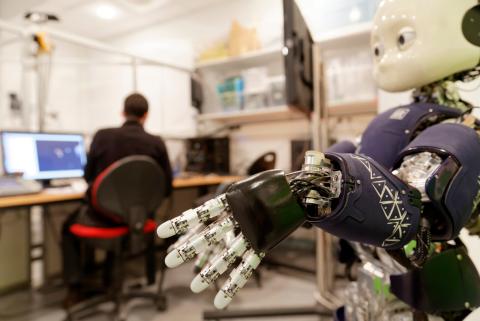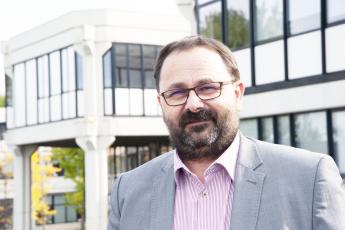
Technological Systems that Respect People and the Environment
Professor of Materials Chemistry at the Université de technologie de Compiègne, Jérôme Favergeon heads the Mastering Safe and Sustainable Technology Systems (MSTD) initiative.

The Sorbonne University Alliance research community is developing innovative technologies that respond to current socio-economic and environmental issues.
How did the Mastering Safe and Sustainable Technological Systems Initiative come about?
Jérôme Favergeon: Created in 2020, the Initiative is part of a multidisciplinary research trajectory linked to technological challenges launched some ten years ago by the LabEx* Maîtrise des systèmes technologiques. The call for initiatives from the Sorbonne University Alliance and the experience we acquired through the LabEx inspired us to develop multidisciplinary research on technological systems.
The initiative also arose from the strong societal mobilization around ecological concerns, which require the development of collaboration between disciplines in the framework of research and education.
What does safety and sustainability mean within the Initiative?
J. F.: They must be understood in a broad sense. The safety of technological systems covers the notions of reliability, availability and security as well as safety for humans. Sustainability can mean maintaining the functional character of the technological system over time, but also minimizing human and environmental costs over its entire life cycle, with particular concern for the preservation of natural resources.
A multidisciplinary approach is part of the DNA of Sorbonne University's initiatives. How is this upheld in yours?
J. F.: The objective of the Initiative is to contribute to improving and creating technological systems that are economically and socially acceptable and respectful of humans and the environment. To achieve this, we require interdisciplinary approaches based on the hybridization of knowledge and practices.
Within the framework of the LabEx, we have already been able to appreciate the difficulties and efforts required for the success of multidisciplinary research. With the Initiative, we want to constitute a scientific community to contribute to technological research that addresses environmental issues. While it seems natural that this community should be based on laboratories focused on engineering, we also want to include laboratories from other fields such as humanities and social sciences, environment and health, as well as the institutes of the Sorbonne University Alliance (the Institute of Environmental Transition, the Institute of Materials, the University Institute of Health Engineering, and others).
What are the Initiative's major research challenges?
J. F.: The Initiative is interested in the functioning of technological systems, such as their production system, design, control, diagnosis and lifespan.
With this perspective, we have defined three areas. The first concerns issues related to mobility and transportation for a sustainable city (such as new mobility devices, eco-navigation, optimizing journeys to reduce carbon footprints, and new energies for vehicles).
The second deals with what we call "green chemistry", i.e. how we can make good use of agro-resources (cultivable and therefore renewable) to manufacture new materials and produce energy.
The last area deals with new technological devices to assist life and health (such as prostheses and organic substitutes), combining the expertise of the humanities and social sciences with that of hard science and medical sciences.
What do you plan to implement to meet these challenges?
J. F.: Each year, two theses and two post-doctoral contracts are funded for four years by the Initiative. We would also like to set up monthly meetings with major clients, such as manufacturers or the Ecological Transition Agency, working with them to identify technological research challenges in a variety of fields, associated with the ambition to reduce environmental impact.
In addition, we wish to develop, within the framework of education, contents and pedagogical formats that are sufficiently open to allow the students of the Sorbonne University Alliance to understand the systems aspect of technologies. If we want to train engineers capable of improving or designing new systems while being concerned about their societal and environmental impact, we must offer them courses at the interface of disciplines (engineering, ecology, health, and others) by drawing on the Alliance's many resources. This can be done, in consultation with training managers, in the form of summer schools, seminars or online courses.
*LabEx: A Laboratory of Excellence project, funded by the French (Government) Excellence Initiative.
